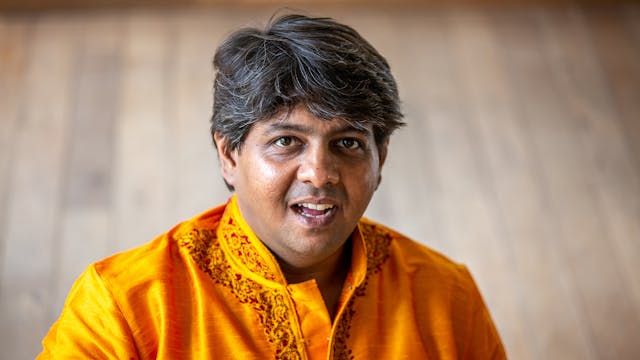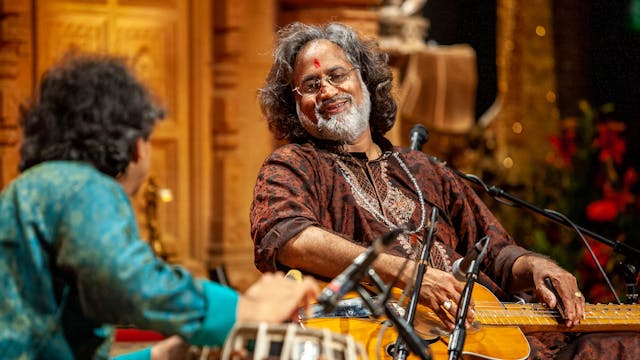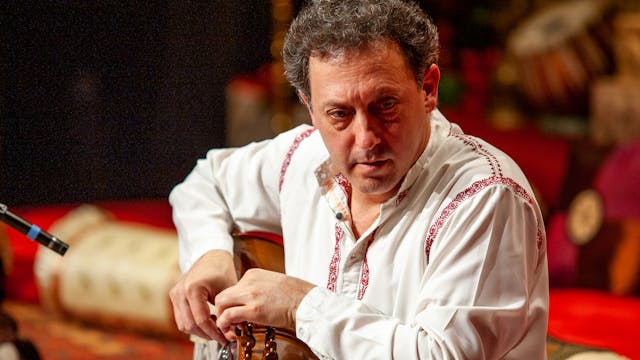Ramakant Gaikwad | Thumri
Thumri and light classical
•
6m 27s
Filmed and recorded live in Mulshi, Maharashtra, India
Musicians:
- Ramakant Gaikwad (khayal)
- Ramkrishna Karambelkar (tabla)
- Abhinay Laxmikant Ravonde (harmonium)
- Gayatri Gaikwad & Dr. Aparna Shenoy (tanpuras)
Thumri in Raag Mishra Bageshri; Thaat: Kafi; Samay: Night
This beautiful thumri in Mishra Bageshri is a traditional composition that was popularised by Ustad Umeed Ali Khan (1910-1979) and subsequently by his contemporaries like Ustad Nazakat Ali (1928-1984) and Ustad Salamat Ali Khan (1934-2001).
Ramakant Gaikwad performs this lighter piece live against the backdrop of the beautiful landscape of Mulshi, Maharashtra. This video is part of the Darbar on-location series that was filmed and recorded live in India in 2017. These short performances are a collection of some of the choicest ragas, bandishes and light-classical pieces that have been rendered in an intimate disposition, devoid of any showmanship, some even with scant or no rhythmic accompaniment in some stunning locations around India.
This series brings out Indian classical music from the modern confines of a concert hall, blending the delicate shrutis (frequencies) with the sights and sounds of nature which is said to be the birth-chamber of Indian classical music.
Gaikwad approaches the thumri through the Patiala prism, maintaining the amorous and spirited cadence of its lyrics in his lustrous voice. The semi-classical piece has a ghazal-like feel to it – a popular poetic genre that consists of rhyming couplets in Persian or Urdu with a light tonal flow. This one however is set to ‘Braj Bhasha’, the pre-dominant language from central India during the 19th century.
He is accompanied beautifully by Ramkrishna Karambelkar on the tabla and Abhinay Lakshmikant Ravonde on the harmonium. Karambelkar’s sprightly lagghi in the end is a commendable demonstration of his ability to switch between pure and light classical forms with command.
Gaikwad had heard this composition in a recording from years ago and noticed the emphasis with which Ustad Umeed Ali Khan had projected the note Pa (5th) in it, digressing skillfully from Bageshri and giving it a ‘mishra’ (mixed) character, adding more layers to it romance. Later, he sought his father and guru Pandit Suryakant Gaikwad’s guidance and contemplated some more to come up with a version that carries a smear of his own delicate nuances with the transposition of Bageshri’s Ma (4th) to Sa (1st).
Up Next in Thumri and light classical
-
Omkar Dadarkar | Raag Patdeep
Filmed on location in India at the Bawali Rajbari, Kolkata, in 2017.
Musician:
- Omkar DadarkarRaag Patdeep; Thaat: Kafi; Samay: Afternoon
Raag Patdeep comes from the same family as Bhimpalasi and retains its heady melodic appeal. In addition, it draws heavily upon the characteristics of Dha...
-
Vishwa Mohan Bhatt | Tilak Kamod
Recorded at Darbar Festival 2007, on 14th April, at the Phoenix Theatre, Leicester.
Musicians:
- Pandit Vishwa Mohan Bhatt (mohan veena)
- Pandit Yogesh Samsi (tabla)Lullaby composed by Pandit Vishwa Mohan Bhatt in Raag Mishra Tilak Kamod, also derived from Thaat Khamaj
This serene lullaby is...
-
Ken Zuckerman | Durgeshwari
Recorded at Darbar Festival 2007, on 15th April, at the Phoenix Theatre, Leicester.
Musicians:
- Ken Zuckerman (Miahar Gharana, Sarod)
- Partha Sarathi Muckerjee (Punjab Gharana, Tabla)
- Debipriya Das (Tanpura)Raag Durgeshwari, Thaat: Kafi, Samay: Afternoon
Ken Zuckerman gives an exceptional...



